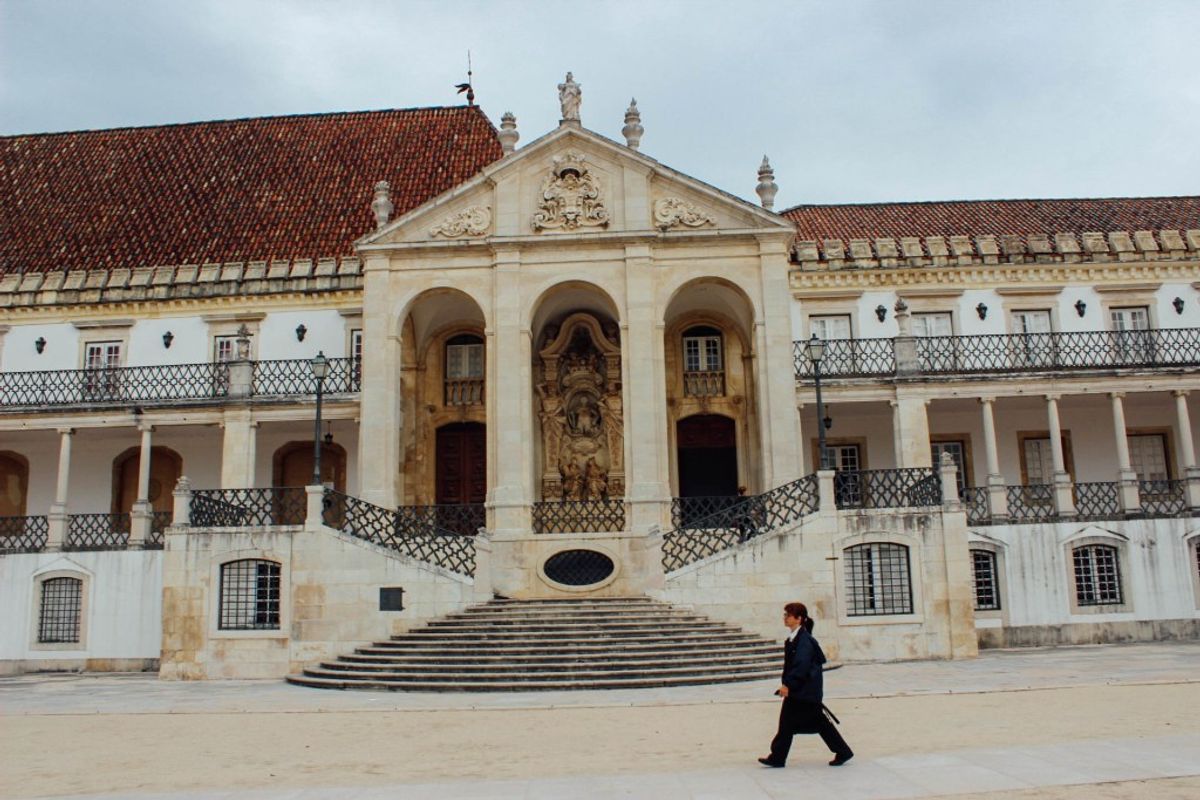The Academic Heart of Portugal: University of Coimbra and Cultural Insights

The Historical Significance of the University of Coimbra
The University of Coimbra stands as a testament to the enduring legacy of education in Portugal. Established in 1290, it is one of the oldest universities in continuous operation worldwide. Its recognition as a UNESCO World Heritage site underscores its global cultural importance.
The university’s historic buildings, such as the Joanina Library, are architectural marvels but the university’s influence extends beyond academia, shaping Coimbra’s identity.
The University of Coimbra is a beacon of knowledge, its impact resonating through time and across borders.
Visitors to Coimbra are often captivated by the university’s blend of medieval charm and academic tradition. The institution not only contributes to the city’s rich cultural tapestry but also to the collective heritage of humanity.
Joanina Library: A Baroque Treasure Trove
The Joanina Library stands as a testament to the grandeur of the Age of Enlightenment. Constructed between 1717 and 1728, it is a jewel in the University of Coimbra’s crown. Named after King John V of Portugal, its Baroque architecture captivates scholars and tourists alike.
Visitors are greeted by opulent rooms, where gold leaf glistens against dark wood shelves. The library houses a collection of rare manuscripts, some dating back to the 16th century. Its three grand rooms, each with a distinct decorative style, are a bibliophile’s dream.
The Joanina Library is not just a repository of books; it is a symbol of knowledge and history, preserved within its ornate walls.
Preservation efforts are noteworthy, including the unique use of bats to protect books from insect damage. This natural method is as fascinating as it is effective. The library’s legacy continues to inspire awe and respect for its contribution to academia and culture.
Fado de Coimbra: The Melodic Expression of Academic Life
Fado de Coimbra is not just music; it’s the soul of the city’s academic spirit. Performed by university students, this unique style of Fado is a deep-rooted cultural tradition. Unlike Lisbon’s Fado, which often speaks of longing and melancholy, Coimbra’s version is more upbeat, reflecting the joviality and camaraderie of student life.
The melodies echo through ancient courtyards, telling tales of student antics and scholarly pursuits.
Attend a performance in one of the historic venues to fully immerse yourself in this emotional musical experience. Here’s how to make the most of it:
- Seek out traditional fado houses; they offer the most authentic settings.
- Evening shows are particularly magical, with the city’s monuments providing a dramatic backdrop.
- Combine dinner and music for a complete cultural evening, as many venues offer this option.
Exploring Coimbra’s Fado scene is a journey through time, where music intertwines with the city’s rich academic history.
Must-See University Landmarks: From Bell Towers to Ancient Ruins
Coimbra’s landscape is dotted with historical landmarks, each telling a story of the city’s rich academic and cultural heritage. The University of Coimbra stands as a testament to the city’s long-standing tradition of scholarship and learning. Visitors are encouraged to explore the campus, where the Joanina Library and the Royal Palace of Alcáçova beckon with their architectural splendor.
- Old Cathedral of Coimbra (Sé Velha): A Romanesque marvel, this cathedral’s fortress-like structure and cloisters are a sight to behold.
- Monastery of Santa Cruz: A historical and architectural gem, offering a glimpse into Portugal’s monastic traditions.
- Arco de Almedina: The gateway to Coimbra’s past, this medieval arch leads to a network of charming streets.
The city’s landmarks are not just structures but symbols of a legacy that continues to inspire.
For a panoramic view of Coimbra, ascend the Almedina Tower. The climb rewards with breathtaking vistas. The Botanical Garden offers a tranquil retreat, while the Machado de Castro National Museum houses Roman ruins that are a must for history enthusiasts. Each site contributes to the mosaic of experiences that Coimbra offers.
Navigating Coimbra: Travel Essentials and Accommodation Choices

Getting to Coimbra: Tips for Travelers from Lisbon and Porto
Coimbra, nestled between Lisbon and Porto, is well-connected by various modes of transport. Here’s how to make the journey smoothly:
-
By Train: The most scenic and relaxing way to reach Coimbra. Regular trains run from both Lisbon and Porto, with the journey taking approximately 1.5 to 2 hours from either city.
By Bus: A cost-effective alternative. Buses may take a bit longer than trains but offer flexible schedules and multiple daily departures.
By Car: For those preferring the freedom of travel, renting a car is an option. The drive from Lisbon takes around 2 hours, and from Porto, it’s about 1 hour and 15 minutes.
Ensure you check the latest schedules and book tickets in advance, especially during peak tourist seasons.
Regardless of your choice, the trip to Coimbra is an opportunity to enjoy the picturesque landscapes of central Portugal. Once in Coimbra, the city’s compact size makes it easy to explore on foot or by public transport.
Accommodation Spectrum: From Luxury to Budget-Friendly Stays
Coimbra offers a range of accommodation options to suit all preferences and budgets. Whether you’re seeking the opulence of a luxury hotel or the affordability of a hostel, this city caters to every type of traveler.
- Luxury: Experience the pinnacle of comfort with five-star amenities and service.
- Mid-range: Enjoy well-appointed rooms with modern conveniences at reasonable prices.
- Budget: Save on costs without sacrificing cleanliness and basic comforts.
- Hostels: Meet fellow travelers in a sociable, budget-friendly environment.
Coimbra’s accommodation spectrum ensures a memorable stay for visitors, regardless of their spending plan.
For those looking to immerse themselves in the local culture, consider a boutique guesthouse. These often reflect the rich mosaic of experiences in Portugal’s cultural tapestry. Alternatively, apartment rentals offer privacy and the chance to live like a local.
Beyond the Beaten Path: Day Trips and Surrounding Attractions
Coimbra’s allure extends beyond its prestigious university and cobblestone streets. Venture out to experience the region’s diverse attractions.
- Conímbriga showcases some of the best-preserved Roman ruins in Portugal, offering a glimpse into ancient history.
- The enchanted forests of Buçaco are perfect for nature lovers, with serene walking trails and the historic Buçaco Palace.
- Schist villages dot the landscape, revealing a traditional way of life amidst stunning scenery.
Coimbra serves as an ideal base for exploring the rich cultural and natural heritage of central Portugal.
For a truly unforgettable experience, include Évora in your itinerary. Its UNESCO World Heritage status speaks to its historical significance, with landmarks that tell tales of times long past. Cozy accommodations ensure a comfortable stay after a day of exploration.
Culinary Delights: Savoring Traditional Portuguese Cuisine
Portuguese cuisine offers a diverse array of flavors, from iconic Bacalhau to regional specialties like Cataplana and Cozido \[Portuguese cuisine offers a diverse array of flavors, from iconic Bacalhau to regional specialties like Cataplana and Cozido \u00e0 Portuguesa. The cuisine reflects rich history and cultural influences.\]\
When in Coimbra, your palate embarks on a journey through Portugal’s culinary heritage. Here are some must-try dishes:
- Bacalhau (salted cod), the nation’s staple, prepared in countless ways.
- Pasteis de nata (custard tarts), a sweet treat not to be missed.
- Francesinha, a decadent sandwich from Porto, layered with meats and melted cheese.
Pair these dishes with a glass of port wine or vinho verde to complete the authentic experience. For a truly immersive taste, join a local food tour. It’s an opportunity to savor a variety of flavors while exploring Coimbra’s charming streets.
Coimbra’s gastronomy is a tapestry of tastes, each dish telling a story of sea, land, and tradition.
Whether you’re dining in a high-end restaurant or a cozy tasca, the city’s food scene will leave you craving for more. Indulge in the richness of Mediterranean flavors and let Coimbra’s culinary delights be a highlight of your visit.













